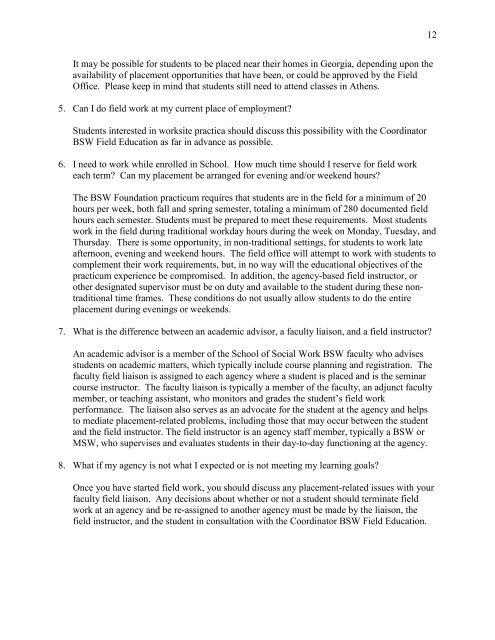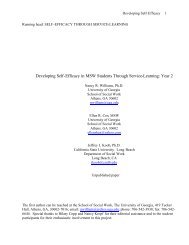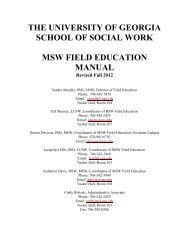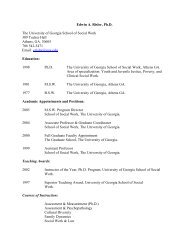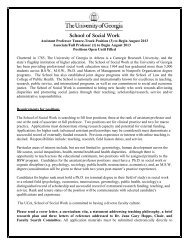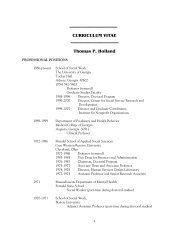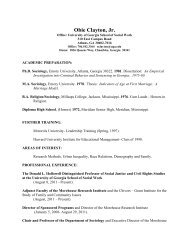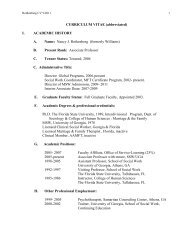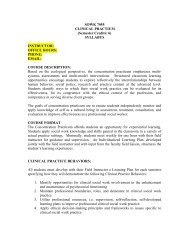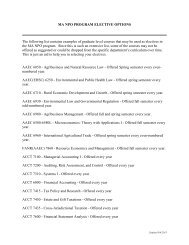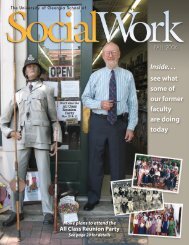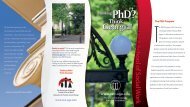BSW Field Education Manual - School of Social Work at the ...
BSW Field Education Manual - School of Social Work at the ...
BSW Field Education Manual - School of Social Work at the ...
Create successful ePaper yourself
Turn your PDF publications into a flip-book with our unique Google optimized e-Paper software.
12<br />
It may be possible for students to be placed near <strong>the</strong>ir homes in Georgia, depending upon <strong>the</strong><br />
availability <strong>of</strong> placement opportunities th<strong>at</strong> have been, or could be approved by <strong>the</strong> <strong>Field</strong><br />
Office. Please keep in mind th<strong>at</strong> students still need to <strong>at</strong>tend classes in A<strong>the</strong>ns.<br />
5. Can I do field work <strong>at</strong> my current place <strong>of</strong> employment<br />
Students interested in worksite practica should discuss this possibility with <strong>the</strong> Coordin<strong>at</strong>or<br />
<strong>BSW</strong> <strong>Field</strong> <strong>Educ<strong>at</strong>ion</strong> as far in advance as possible.<br />
6. I need to work while enrolled in <strong>School</strong>. How much time should I reserve for field work<br />
each term Can my placement be arranged for evening and/or weekend hours<br />
The <strong>BSW</strong> Found<strong>at</strong>ion practicum requires th<strong>at</strong> students are in <strong>the</strong> field for a minimum <strong>of</strong> 20<br />
hours per week, both fall and spring semester, totaling a minimum <strong>of</strong> 280 documented field<br />
hours each semester. Students must be prepared to meet <strong>the</strong>se requirements. Most students<br />
work in <strong>the</strong> field during traditional workday hours during <strong>the</strong> week on Monday, Tuesday, and<br />
Thursday. There is some opportunity, in non-traditional settings, for students to work l<strong>at</strong>e<br />
afternoon, evening and weekend hours. The field <strong>of</strong>fice will <strong>at</strong>tempt to work with students to<br />
complement <strong>the</strong>ir work requirements, but, in no way will <strong>the</strong> educ<strong>at</strong>ional objectives <strong>of</strong> <strong>the</strong><br />
practicum experience be compromised. In addition, <strong>the</strong> agency-based field instructor, or<br />
o<strong>the</strong>r design<strong>at</strong>ed supervisor must be on duty and available to <strong>the</strong> student during <strong>the</strong>se nontraditional<br />
time frames. These conditions do not usually allow students to do <strong>the</strong> entire<br />
placement during evenings or weekends.<br />
7. Wh<strong>at</strong> is <strong>the</strong> difference between an academic advisor, a faculty liaison, and a field instructor<br />
An academic advisor is a member <strong>of</strong> <strong>the</strong> <strong>School</strong> <strong>of</strong> <strong>Social</strong> <strong>Work</strong> <strong>BSW</strong> faculty who advises<br />
students on academic m<strong>at</strong>ters, which typically include course planning and registr<strong>at</strong>ion. The<br />
faculty field liaison is assigned to each agency where a student is placed and is <strong>the</strong> seminar<br />
course instructor. The faculty liaison is typically a member <strong>of</strong> <strong>the</strong> faculty, an adjunct faculty<br />
member, or teaching assistant, who monitors and grades <strong>the</strong> student’s field work<br />
performance. The liaison also serves as an advoc<strong>at</strong>e for <strong>the</strong> student <strong>at</strong> <strong>the</strong> agency and helps<br />
to medi<strong>at</strong>e placement-rel<strong>at</strong>ed problems, including those th<strong>at</strong> may occur between <strong>the</strong> student<br />
and <strong>the</strong> field instructor. The field instructor is an agency staff member, typically a <strong>BSW</strong> or<br />
MSW, who supervises and evalu<strong>at</strong>es students in <strong>the</strong>ir day-to-day functioning <strong>at</strong> <strong>the</strong> agency.<br />
8. Wh<strong>at</strong> if my agency is not wh<strong>at</strong> I expected or is not meeting my learning goals<br />
Once you have started field work, you should discuss any placement-rel<strong>at</strong>ed issues with your<br />
faculty field liaison. Any decisions about whe<strong>the</strong>r or not a student should termin<strong>at</strong>e field<br />
work <strong>at</strong> an agency and be re-assigned to ano<strong>the</strong>r agency must be made by <strong>the</strong> liaison, <strong>the</strong><br />
field instructor, and <strong>the</strong> student in consult<strong>at</strong>ion with <strong>the</strong> Coordin<strong>at</strong>or <strong>BSW</strong> <strong>Field</strong> <strong>Educ<strong>at</strong>ion</strong>.


